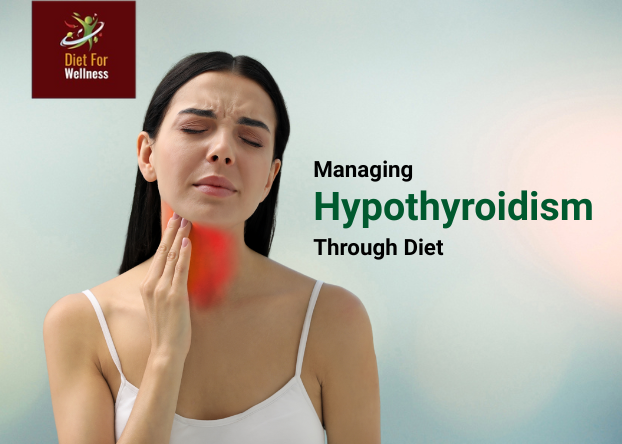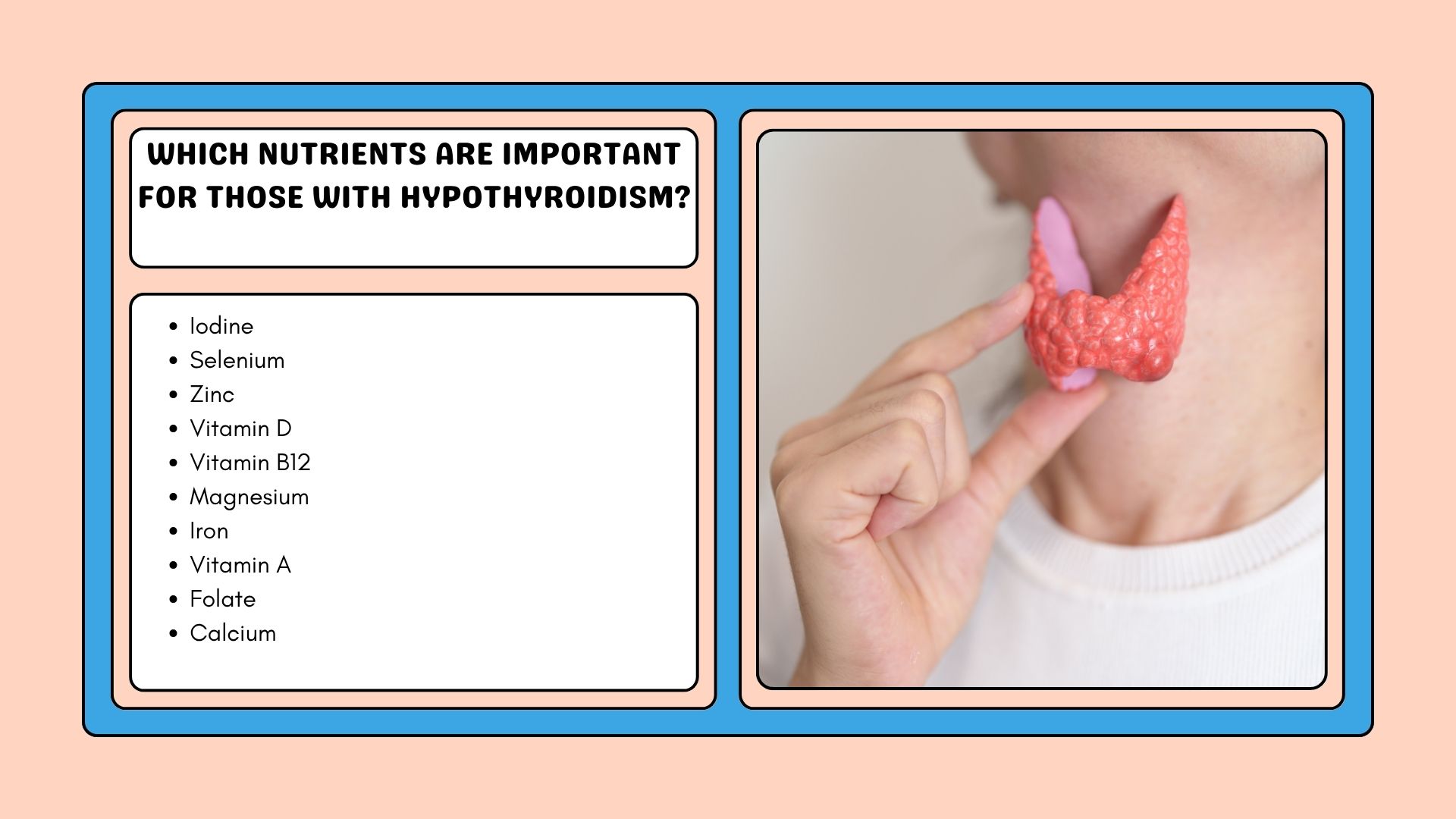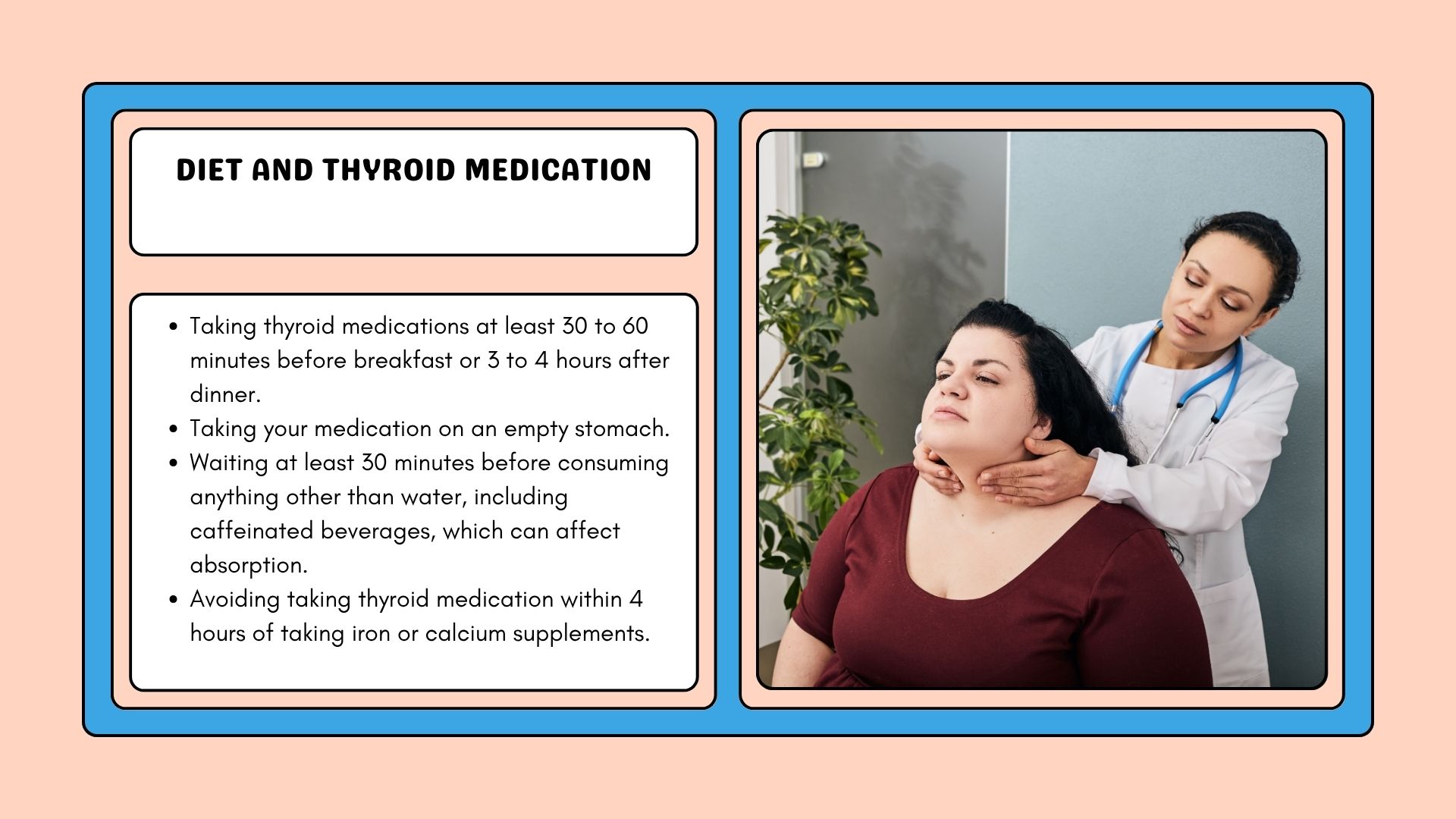Managing Hypothyroidism Through Diet

Hypothyroidism, a condition where the body doesn’t produce enough thyroid hormones, impacts essential bodily functions such as growth, cell repair, and metabolism. While medication is the primary treatment, a balanced and nutritious diet can help reduce symptoms and support overall health.
Can Specific Diets Help People with Hypothyroidism?
For individuals with hypothyroidism, including Hashimoto’s thyroiditis, dietary interventions may offer benefits like the following
- Improving thyroid function.
- Assisting in maintaining a moderate body weight.
- Reducing symptoms of hypothyroidism.
- Minimizing nutrient deficiencies that can exacerbate symptoms.
Eating patterns that are beneficial for people with hypothyroidism are as follows-
- Mediterranean diet– Rich in vegetables and fruits, this diet may offer protection against cellular damage.
- Anti-inflammatory diet– Focuses on reducing the inflammation in the body.
- Paleo diet– Emphasizes whole, unprocessed foods.
- Autoimmune elimination diets– These should only be followed under the guidance of a medical professional.
A diet low in pro-inflammatory foods, added sugar, and ultra-processed foods is helpful for many individuals with hypothyroidism. Including foods rich in specific nutrients can also support thyroid health.
Which Nutrients Are Important for Those with Hypothyroidism?
The specific nutrients that benefit individuals with hypothyroidism can vary depending on the type of hypothyroidism. Doctors may suggest addressing nutritional deficiencies through dietary adjustments or supplements.

Iodine
Iodine is an important mineral for thyroid hormone production, and a deficiency can result in certain types of hypothyroidism. Iodine deficiency is one of the most common causes of hypothyroidism.
While less common in developed countries, populations at higher risk of iodine deficiency include
- Individuals who do not use iodized salt.
- Pregnant individuals.
- People following vegan diets.
Excessive iodine intake can also be harmful, especially for those with autoimmune hypothyroidism like Hashimoto’s thyroiditis. It is advisable to consult a healthcare professional regarding iodine intake if you have a thyroid condition. They can check your iodine levels and help you manage your intake. They may suggest avoiding high-iodine foods such as seaweed, kelp or dulse, and iodine-enriched salt.
Selenium
Selenium is a mineral that supports thyroid hormone production and helps protect the thyroid from oxidative stress damage. Research shows the link of selenium deficiency to the development of autoimmune thyroid disease, including Hashimoto’s thyroiditis.
Incorporating selenium-rich foods can increase your selenium levels. These include Brazil nuts, eggs, and legumes.
Currently, experts do not recommend selenium supplements for hypothyroidism, as more research is needed. However, a healthcare professional may suggest supplementation for individuals with a selenium deficiency who cannot obtain enough through food.
The National Institutes of Health (NIH) mentions 400 mcg as the daily upper limit for adults. High selenium intake over time can lead to symptoms like hair and nail loss, diarrhea, nausea, and skin rash. Consuming excessive amounts can even result in selenium toxicity, with serious and potentially fatal effects such as kidney failure, heart attack, and breathing problems.
Zinc
Zinc is important for thyroid hormone production and overall thyroid function. Insufficient zinc can negatively impact thyroid function and general health, potentially leading to or worsening hypothyroidism. A 2021 study suggested that increasing zinc, vitamin A, and selenium intake might enhance thyroid hormone production in people with hypothyroidism.
If you suspect a zinc deficiency, consult a healthcare professional to determine if a zinc supplement is appropriate.
Other Important Nutrients
Other nutrient deficiencies that may result in or worsen hypothyroidism include
- Vitamin D– Low levels pose a risk factor for autoimmune thyroid conditions and can negatively affect thyroid function. Supplements are often necessary as it’s not highly concentrated in many foods.
- Vitamin B12– Deficiency is very common among people with hypothyroidism. A doctor may recommend B vitamin-rich foods or B12/B-complex supplements if levels are low.
- Magnesium– Low magnesium levels may result in thyroid dysfunction and hypothyroidism. Magnesium-rich foods or supplementation may improve hypothyroid symptoms.
- Iron– Low iron levels or iron deficiency anemia can harm thyroid function. Supplementation is often needed to achieve and maintain recommended iron levels.
- Other potentially contributing deficiencies include vitamin A, folate, and calcium.
Foods to Limit if You Have Hypothyroidism
Limiting or avoiding certain foods help in supporting thyroid function and overall health if you have hypothyroidism.
Ultra-processed foods
Ultra-processed foods can increase inflammation and oxidative stress in the body. Oxidative stress, which is an imbalance between free radicals and antioxidants, can lead to cellular damage. Hashimoto’s thyroiditis can increase inflammation markers and oxidative stress, and eating ultra-processed foods can worsen these markers, negatively affecting thyroid function and overall health.
Examples of ultra-processed foods to avoid include processed snack foods (like potato chips), soda and sweetened beverages, sweetened breakfast cereals, and flavored granola bars with preservatives.
Gluten
Gluten, a group of proteins found in wheat, barley, triticale, and rye, triggers an autoimmune reaction in individuals with celiac disease, damaging the digestive tract and impairing nutrient absorption. This can result in nutrient deficiencies and inflammation, potentially worsening hypothyroidism.
If you have a gluten intolerance, a gluten-free diet is typically recommended. However, it’s best to consult a doctor or dietitian before making significant dietary changes.
Goitrogens
Goitrogens are found in soy products and cruciferous vegetables like cabbage. Some research say they may interfere with thyroid hormone production.
Most individuals, including those with hypothyroidism, can consume moderate amounts of goitrogenic foods without negative effects on thyroid health. These include cabbage, soy, and pearl millet. Cruciferous vegetables like broccoli are low in goitrogens, and cooking these reduces their activity, making them safer. However, restricting large, regular consumption of juice made with raw cruciferous vegetables may be advisable.
A 2024 review shows these foods may not have the negative impact on thyroid function previously indicated. Always discuss with a doctor before eliminating foods from your diet.
Foods to Eat if You Have Hypothyroidism
A diet rich in nutritious foods can improve overall health and reduce the risk of conditions linked with hypothyroidism, such as heart disease, obesity, and type 2 diabetes. A high-fiber diet helps reduce constipation, a common symptom of hypothyroidism.
Incorporate the following nutritious foods into your diet if you have hypothyroidism
- Fruit– Berries, peaches, apples, pears, grapes, pineapple, citrus fruits, bananas.
- Non-starchy vegetables– Carrots, spinach, peppers, mushrooms.
- Starchy vegetables– Sweet potatoes, potatoes, peas, butternut squash.
- Lean fish, eggs, meat, and poultry– Fish, eggs, chicken.
- Healthy fats– Olive oil, avocados, coconut oil, unsweetened coconut, full-fat yogurt.
- Whole grains– Brown rice, rolled oats, quinoa, brown rice pasta.
- Seeds, nuts, and nut butters– Almonds, cashews, pumpkin seeds, natural peanut butter.
- Beans and lentils– Chickpeas, kidney beans, lentils.
- Dairy and nondairy substitutes– Coconut milk, almond milk, unsweetened yogurt, cheese.
- Spices, herbs, and condiments- Paprika, turmeric, saffron, fresh or dried herbs (basil, rosemary), mustard.
- Beverages– Water, unsweetened tea, coffee, sparkling water.
Some individuals with hypothyroidism may benefit by avoiding foods they are sensitive to, such as gluten or dairy. If possible, consult with a registered dietitian to identify foods you may need to limit or avoid and to develop a balanced eating plan that doesn’t unnecessarily restrict nutrient-rich ingredients.
Diet and Thyroid Medication
To ensure best absorption, take your thyroid medication on an empty stomach. This includes avoiding foods, beverages, and supplements that could interfere with absorption.
Experts typically suggest

While there’s no single “best” diet for hypothyroidism, consuming the right nutrients in conjunction with medication can help manage symptoms, improve thyroid function, and promote overall well-being. A diet rich in whole, nutrient-dense foods like vegetables, fruits, nuts, and fish is generally beneficial for individuals with hypothyroidism.
